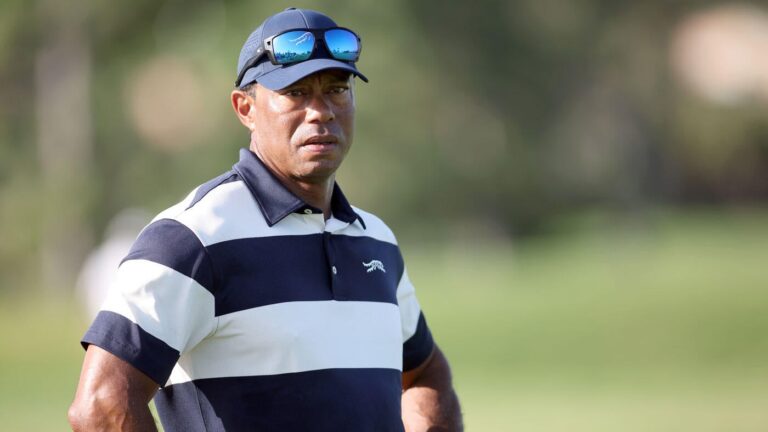PGA Tour CEO Brian Rolapp held the first press conference of his tenure Wednesday ahead of the 2025 Tour Championship and announced the formation of a new committee that will be chaired by Tiger Woods. The committee has been dubbed the Future Competition Committee and will consist of six players and three business advisors to take a holistic look at the competitive model of the PGA Tour.
Woods will chair the effort with other PGA Tour members Patrick Cantlay, Adam Scott, Camilo Villegas, Maverick McNealy and Keith Mitchell also serving on the committee. The nine-person ensemble is rounded out by Joe Gorder, John Henry and Theo Epstein. Epstein serves as a senior advisor at Fenway Sports Group — which is part of the investment consortium Strategic Sports Group — and was influential in radical changes in Major League Baseball such as the pitch clock.
“The purpose of this committee is pretty simple,” Rolapp said. “We’re going to design the best professional golf competitive model in the world for the benefit of PGA Tour fans, players and their partners. It is aimed at a holistic relook of how we compete on the Tour. That is inclusive of regular season, postseason and offseason. We’re going to focus on the evolution of our competitive model and the corresponding media products and sponsorship elements and model of the entire sport. The goal is not incremental change. The goal is significant change.”
2025 Tour Championship picks, odds: Expert predictions, favorites to win FedEx Cup Playoffs from betting field
Patrick McDonald
The committee is expected to possess a wide reach and utilize input from fans, players and partners. It will be guided by the three governing principles of parity, scarcity and simplicity as it aims to strengthen the meritocratic structure and simplify the connection between the regular season and the postseason in order to highlight the Tour Championship.
Focuses will include getting the top players to compete together more often in meaningful tournaments and making the season-long race easier for fans to follow. Rolapp did not have a specific number of signature events in mind when discussing the top players coming together on a more regular basis as the PGA Tour announced on Tuesday the addition of one — upping the total to nine — to its 2026 schedule.
“I honestly believe that we need to better serve golf fans, but I also believe the PGA Tour can better serve sports fans, and in order to do that, I think some of these characteristics need to come into play,” Rolapp said. “Everybody wants competitive parity. Everybody wants to go into an event not knowing who’s going to win. My old job, I think we obsessed about these things. Other than the NFL, I think golf is the closest thing that I’ve seen that’s sort of competitive parity. In my old world, we could pick five teams we think are going to win the Super Bowl, and I think we’d probably both be wrong. I think golf has similar characteristics, so I think that’s a strength we’re going to lean into.
“But also the events need to matter, and you need to understand as a fan what the stakes are. If this person wins, if this person loses, if this person finishes here on the leaderboard, what does that mean and how does that tie to the postseason? I think every sport who’s successful has that, and I think we’re going to chase that.”
Rolapp stated the committee has yet to meet and was formed in the last few weeks, but they will get to work as soon as possible.
After spending 22 years with the NFL, Rolapp was announced as the PGA Tour’s first CEO back in June, and essentially replaced PGA Tour commissioner Jay Monahan, who has been at the helm since 2017. Long seen as NFL commissioner Roger Goodell’s successor, Rolapp was responsible for the league’s television contracts, digital media rights and relationship and sponsorships — experience he believes he will able to translate to his role with the PGA Tour.
“I think a lot of what I learned at the NFL can be applied here, and part of it — look, the sports business is not that complicated,” Rolapp said. “You get the product right, you get the right partners, your fans will reward you with their time because they’re telling you it’s good and they want more of it, and then the commercial and the business part will take care of itself.
“Then you just have to constantly innovate. I think if there’s anything I learned at the NFL, it’s that. We did not sit still, [we] changed rules every March. We changed the kickoff rule. That’s what I mean by honoring tradition but not being bound by it. I think that level of innovation is what we’re going to do here, and I think that’s one lesson I’ve learned.
“I will say in talking with all the stakeholders, everyone seems excited about that, and I think realizes that given the strong foundation we have, if we apply some of that, we think we can make it better. So that’s been exciting. By the way, chief among them, the players. I haven’t heard anything other than excitement to do that. So we’re going to try.”
